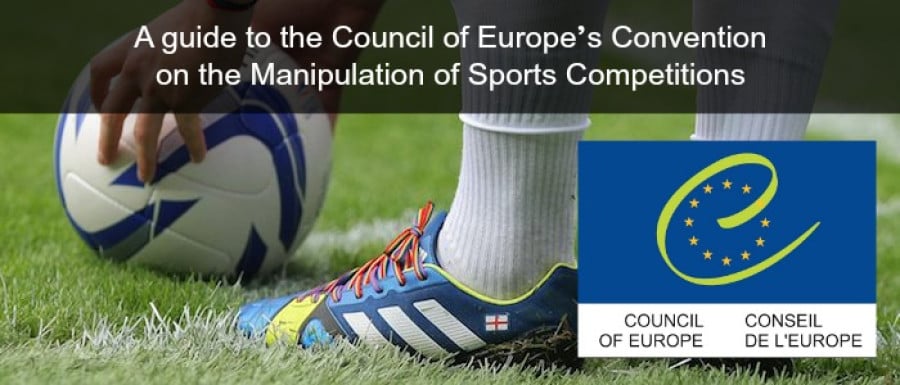Combating match-fixing in sport - a guide to the Council of Europe’s Convention on the Manipulation of Sports Competitions

On 18 September 2014, the sports ministers of 15 of the member states of the Council of Europe (‘the CoE’) signed potentially the most significant legal instrument relating to match-fixing worldwide: Council of Europe Convention on the Manipulation of Sports Competitions (‘the Convention’).1 Adopted at the same time was an Explanatory Report on the Convention.2
The Convention has, quite rightly, received a significant amount of media coverage around the world. However, little has been written about the legal content within the Convention. This blog will look at the most legally significant elements of the Convention and the Explanatory Report.
History of the Convention3
The CoE first discussed match-fixing in 2008 at a ministerial meeting held in Athens. The CoE Committee of Ministers then adopted the ‘Recommendation on promotion of the integrity of sport against manipulation of results, notably match-fixing’ in 2011, which although not legally binding on Member States, had significant political weight and led to work beginning on the Convention in September 2012. The Convention had to go through a number of stages of the CoE’s legislative process, which included input from a number of key stakeholders in sport, not just the member states themselves.4
The two year drafting and negotiating process was co-ordinated and led by the CoE’s Enlarged Partial Agreement on Sport (‘EPAS’) which provides a platform for intergovernmental sports co-operation between the public authorities of its member states and encourages dialogue between public authorities, sports federations and non-governmental organisations.5
The Council of Europe
To begin with, for international readers it may be helpful to explain what the Council of Europe is; European readers may wish to skim over this section. First and foremost, the CoE is a separate organisation to the European Union (‘the EU’), with the EU being a unique economic and political partnership between 28 European countries. In contrast, the CoE is the continent's leading human rights organisation, having 47 member states (all 28 members of the EU are also members of the CoE) and all CoE member states have signed up to the European Convention on Human Rights (‘the ECHR’), a treaty designed to protect human rights, democracy and the rule of law after the Second World War.6
Council of Europe’s policy on sport
The main thrust of the CoE’s policy on sport, through EPAS, has been to uphold certain principles, including the independence and autonomy/self-regulation of sport, whilst at the same time seeking to prevent certain adverse phenomena in sport such as doping7, spectator violence8 and now match-fixing.
Despite being a European led instrument, the CoE are extremely mindful of the truly global nature and threat from match-fixing and are encouraging non-CoE member states and non-European countries to Register to it, which is why Australia, New Zealand, Canada, Japan and Morocco have been consulted during the negotiations and are expected to sign the Convention.9
The structure of The Convention
The Convention is a legally binding instrument structured by way of a Preamble with 9 Chapters made up of 41 Articles that cover in total: prevention, law enforcement, international co-operation measures and the exchange of information.
There are a number of important overriding principles and background set out in the Preamble, of note is that the CoE attribute the significant increase in the number of cases to two specific elements:
- the proliferation of different types of betting; and,
- the development of a large illegal betting market.
Furthermore, the threat to the rule of law is specifically mentioned due to the fact that, “The manipulation of sports competitions poses a challenge to the rule of law because it is linked to fraud, organised crime and corruption.” (para 6, Explanatory Report).
To continue reading or watching login or register here
Already a member? Sign in
Get access to all of the expert analysis and commentary at LawInSport including articles, webinars, conference videos and podcast transcripts. Find out more here.
- Tags: Anti-Corruption | Council of Europe Convention on the Manipulation of Sports Competitions | Criminal Law | Data Protection Act 1998 | Governance | INTERPOL | Match-Fixing | Olympic Games | Regulation | The Council of Europe (CoE) | United Kingdom (UK)
Related Articles
- Betting in sports and integrity at the London Olympics: an insight from the UK Gambling Commission – Part 1
- Betting in sports and integrity at the London Olympics: an insight from the UK Gambling Commission – Part 2
- Punishment & redemption: consistency in sanctions for doping & match-fixing
- The battle for integrity in sport
- Match-fixing and the potential ‘Matuzalem effect’
- A kick in the assets: How UK authorities can recover the profits of match fixing
Written by
Kevin Carpenter
Kevin is a advisor and member of the editorial board for LawInSport, having previously acted as editor.
Kevin specialises in integrity, regulatory, governance and disciplinary matters. His expertise and knowledge has led him to be engaged by major private and public bodies, including the IOC, FIFA, the Council of Europe, INTERPOL and the United Nations Office on Drugs and Crime (UNODC), as well as making regular appearances internationally delivering presentations and commenting in the media on sports law issues.
His research and papers are published across a variety of forums, including having a blog on LawInSport.

 Global Summit 2024
Global Summit 2024